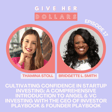
Bridging the Gender Wealth Gap through Passive Real Estate Investing with the Founder of HYLEE Capital
Update: I recently launched my newsletter, The Sheconomist, and would love for you to subscribe: sheconomist.com - I share so many tools and resources that help young, high-achieving women with radical money and career self-advocacy.
----
Interested in real estate investment? Then today's episode is for you as we welcome Sarah Miskelly, Founder of HYLEE Capital, to the show.
Sarah's introduction to the world of real estate began at a young age, working alongside her father in acquiring and managing small multifamily properties. Despite facing the tragic loss of her father at age 16, Sarah's resilience propelled her to take charge of his multifamily portfolio, igniting a passion for real estate investment that would shape her future endeavors.
With HYLEE Capital, Sarah wants to bridge the gender wealth gap, empowering women to navigate the intricacies of real estate investment with confidence.
Dispelling misconceptions about real estate investment, Sarah highlights the myriad opportunities available beyond traditional property management, from passive syndications to multifamily investments, and shares advice on how to get started.



















